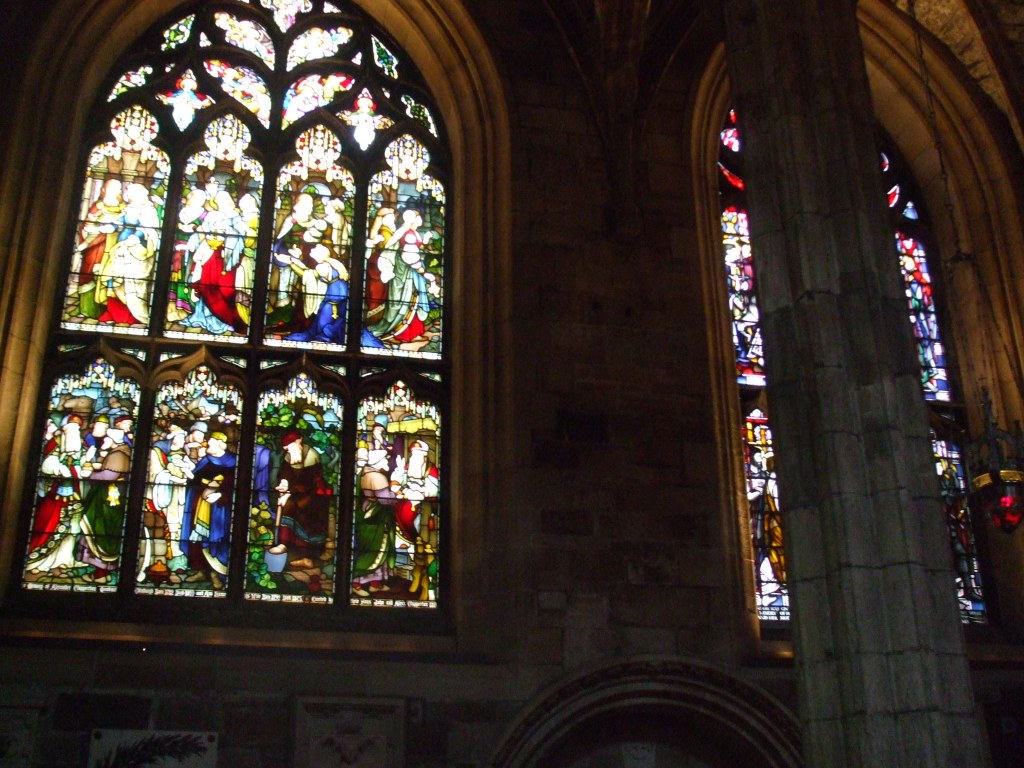
I am a Christain.
I am also a writer.
Does that make me a Christian writer?
C.S. Lewis and Tolkien would say “yes,” but many in the Christian world say “no.” I have often heard that one should not consider themselves a Christian writer, or at least a writer of Christian fiction, unless their stories explicitly or allegorically talk about Jesus Christ.
I disagree with this sentiment.
God is nearly impossible to write in fiction because we can’t create a predictable pattern to the way He works and develops us in our Christian walk. Why does He act at one time and not in another? Why is it so hard to know what to do at so many significant crossroads in our lives?
Les Miserables is a great Christian novel, but it isn’t sold as Christian fiction. In fact, it doesn’t really fit the genre of Christian fiction except that the characters are trying to figure out how to live like a Christian in a messy world in which right and wrong wasn’t obvious.
I once had a friend who said Ben Hur was the greatest Christian fiction movie ever for him. Jesus’s face was never shown, yet there was so much God in that story. The character of Ben Hur is significantly changed by this mysterious God.
I also love The Mark of the Lion series by Francine Rivers. These characters live difficult lives that progressively deteriorate even while having faith in God. This one of the few books that I list in this article that is sold as Christian fiction. The reason is because Jesus is talked about by name.
In all of these examples, the characters have complicated lives with tough choices. Deus Ex Machina doesn’t just make everything ok. It is their obedience to God that makes the main difference. These books don’t try to deal with who God is, but who we become because of Him. These are not cosmic stories, but stories about individual people.
I think this is part of the reason Paul in the Bible puts so much emphasis on our testimonies. The gospels tell us what God did, but our testimonies and what he does in individual lives explains the “why” better than anything else. What does it look like when God and man are reconciled? How does that really change us and the people around us?
It is interesting that both Les Miserables and Ben Hur are not sold as Christian fiction, but as either classics or historical fiction. A person might be able to find them in a Christian book store (maybe in the homeschooling area), but plenty of non-Christians read these.
One of the issues I find with writing Christian fiction is that the theological position a person takes significantly influences the market for that book. My husband spent many years working in Christian bookstores for various denominations. Their politics over what to sell has dramatically influenced my marketing strategy. Very few speculative fiction books are carried in these books stores except those written by the big-name authors. It is mostly historical fiction or Christian romance. Even with the big names in speculative fiction, you will find that it is focused on spiritual warfare, allegory, or apocalyptic/end times.
Since I love fantasy (of which you will find only Tolkien and C.S. Lewis in these stores), I have decided there was no point in marketing myself as “Christian” even if my books deal with Christian themes.
Who am I selling too? Christians who won’t buy my book?
I like sticking with Christian themes rather than theological issues because outside of reality, theology doesn’t make sense. As an author, I struggle to recreate the logic of God. This world was created perfectly with a complex history of salvation leading to Jesus’ death and resurrection and then away from it to now. A summary of this plan in a fantasy setting is often skewed and lacking.
I find that most books (indie and traditionally published books alike) that try to deal with the issues of salvation or theology in an imaginary world have major theological problems. This might be the reason so many bookstores don’t carry Christian fantasy fiction. To enjoy the books, I often look past the logical fallacies to the images the author tries to paint. I appreciate what the author is trying to do, but I meet so many people who have baggage they can’t carry from ideas just like these. Mature Christians are edified by these books because we can see what the author is doing, but immature Christians easily swing to extremes in their theology because it seems right in this make-believe context. Just take as an example all the people who think the Left Behind Series is true theology. Or even look at all those who think the DaVinci Code is a real argument against Christianity. Both of these books are fiction for a reason!
This fictionalizes gospel causes so many problems. Why not deal with Christian themes instead: Why do bad things happen to good people? The sovereignty of God, the love of God, our dependence on the God who created us, God’s grace when we have to make morally ambiguous choices, our obedience in forgiving others or turning the other cheek. These issues are not divorced from theology, but they are more universal and personal. We can keep God more hidden (i.e., don’t talk about His origins, His work in history, His salvation plan, or His cosmic plan for the universe) which often don’t work in hypothetical worlds and focus on the effects following God brings into a person’s life.
George MacDonald, C.S. Lewis, and Tolkien wrote fantasy fiction in which arbitrary magic happens, and the rules of the world are altered. Yet all of these solid Christians deal with virtue: the battle of good vs. evil inside of us.
Have you noticed that more secular books and good and evil outside of the hero? Many Christian books mimic this as well. The enemy in many books by George MacDonald, C.S. Lewis, and Tolkien is some monster, but the hero must overcome themselves to get there. The best books do this, but I argue that Christians can do it better, if done right.
Maybe this doesn’t seem possible, but I argue that it is more relevant to Christians and non-Christians alike. It isn’t what God is doing out there and separate from us in His grand plan for the world. Instead, deal with what it looks like to live as a Christian on a daily basis, the internal character development from morally grey to finding strength in the ways of God. It’s something that can be even more difficult to wrestle with in a novel because it’s not easy and does not often fit the typical fantasy tropes of revenge, assassination, theiving, trickery, or being the prophesied one. The inner reality of what God’s work does inside of us causes conflict in the face of crises. Do we do what is easy or do we do what is right? I guess each author has his own story to tell, but when I read secular books, I see a need for an internal struggle that is compelling. Most Christians leave this out because they are so focused on the cosmic battle between good and evil.
Pilgrims Progress is an allegory which I am typically not a fan, but it does illustrate what I am trying to say. God is not a character in the book. Jesus’s salvation act is not explicitly depicted in the book, just symbolized by a cross at one point. Instead, the whole book is about the development of Christian in response to what God has already done. Is there any denomination who has a problem with Pilgrim’s Progress? No, because this internal struggle is universal to all of us, yet this book is not lacking in spiritual relevance.
I suppose my use of the term “theology” as referring to the grander issues of God’s cosmic plan, His nature, and His mind is a problem because this is theology too. My point though is that there are only a few points in this book that would make it obviously Christian (the name Christian, the names of various other characters, and the scene with the cross). If you changed those (a different image to represent the cross) and wrote this book today, would it be accepted as Christian fiction or just become a typical fantasy quest novel?
I honestly don’t know how well this kind of book fits in either Christian or secular markets, and I still struggle to figure out where my books belong in that respect. I guess I am just muddying up the water some more.
So where does that leave me?
I’m a Christian.
And I’m a writer.
I write books about being a Christian, but I guess they aren’t Christian fiction.
They’re just good books.


2 responses to “Article: The Problem with Christian Fiction by Lara Lee”
Yes, this!
LikeLike
I am writing a novel and am exploring the very issues you mention here. I would very much like to have a conversation with you to explore this further as part of my research.
LikeLike